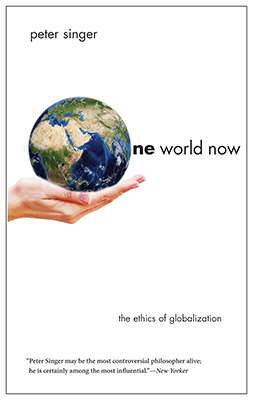One World Now
“One World Now: The Ethics of Globalization” by Peter Singer is a thought-provoking examination of the ethical implications of globalization and the challenges it presents for individuals, societies, and the global community. Here’s a summary:
Introduction to Globalization: Singer begins by defining globalization as the increasing interconnectedness and interdependence of people, economies, and cultures around the world. He discusses the economic, technological, and political forces driving globalization and its impact on human societies.
Ethical Dimensions of Globalization: Singer explores the ethical dilemmas posed by globalization, including issues of economic inequality, environmental degradation, cultural homogenization, and social justice. He argues that globalization has both positive and negative consequences and requires careful ethical consideration.
Economic Globalization: Singer discusses the economic aspects of globalization, including trade liberalization, outsourcing, and the rise of multinational corporations. He examines the effects of globalization on global poverty, income inequality, and labor rights, highlighting the need for ethical frameworks to guide economic policies.
Environmental Challenges: Singer examines the environmental consequences of globalization, including climate change, deforestation, and pollution. He discusses the ethical responsibilities of individuals, corporations, and governments to address environmental degradation and promote sustainability on a global scale.
Cultural Diversity: Singer explores the cultural dimensions of globalization, including the spread of Western values and consumer culture. He discusses the importance of preserving cultural diversity and respecting the rights and traditions of indigenous peoples and minority groups in the face of globalization.
Global Governance: Singer discusses the need for effective global governance mechanisms to address transnational challenges such as poverty, disease, and terrorism. He examines the role of international institutions such as the United Nations, World Bank, and International Monetary Fund in promoting global cooperation and addressing global issues.
Ethical Responsibility: Singer argues that individuals, corporations, and governments have a moral obligation to promote ethical globalization by upholding human rights, environmental sustainability, and social justice. He calls for greater awareness, activism, and accountability to address the ethical challenges of globalization.
Conclusion: Singer concludes by emphasizing the importance of ethical reflection and action in shaping the future of globalization. He calls for a renewed commitment to global cooperation, solidarity, and compassion to create a more just and sustainable world for all.
In summary, “One World Now: The Ethics of Globalization” provides a comprehensive exploration of the ethical dimensions of globalization, offering insights into the complex challenges and opportunities facing humanity in an increasingly interconnected world. Singer’s work encourages readers to critically examine their roles and responsibilities in shaping the ethical course of globalization and promoting a more equitable and sustainable global society.

